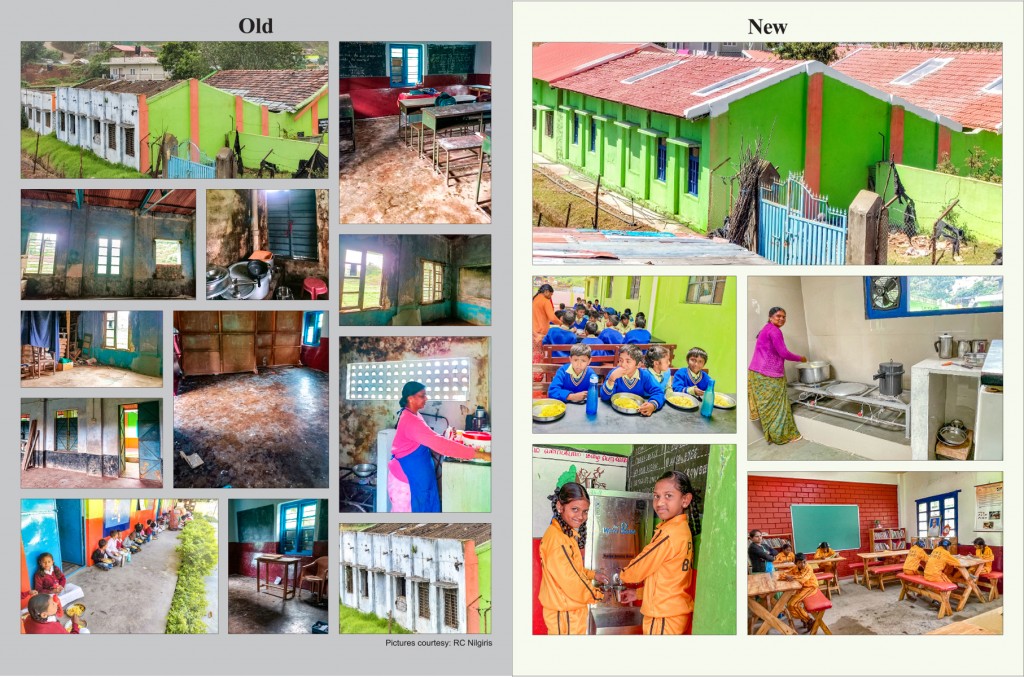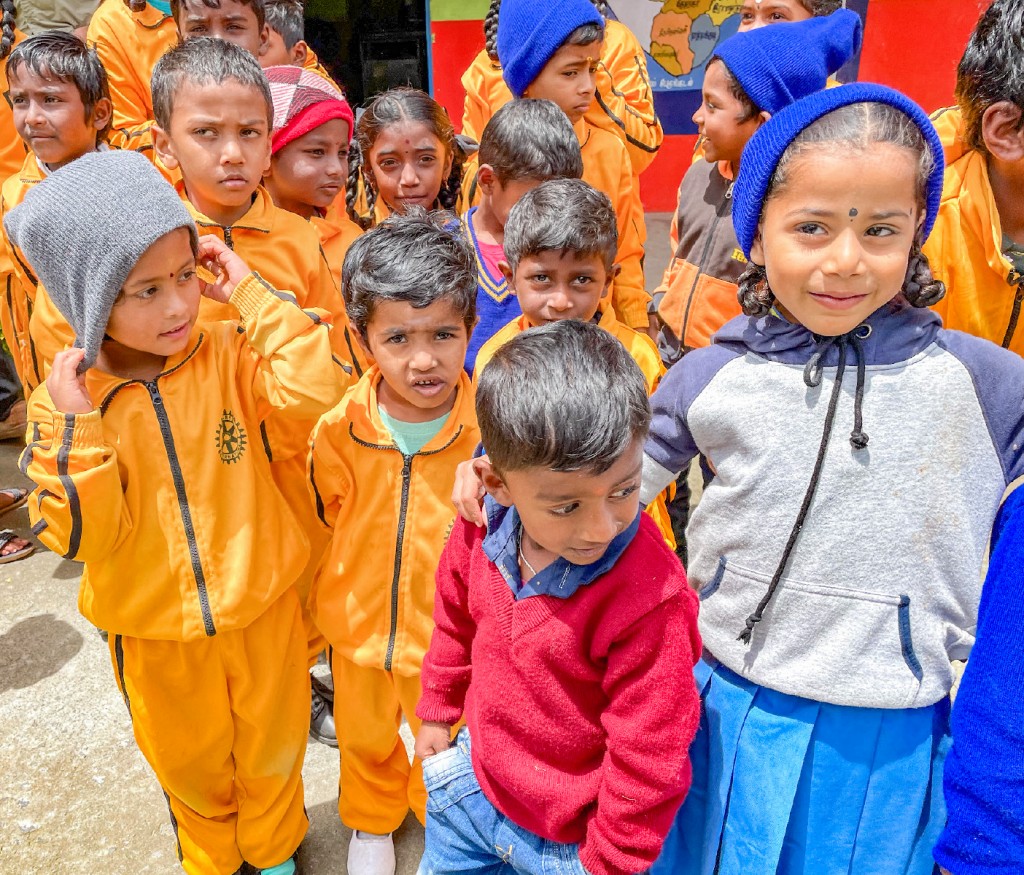RC Nilgiris creates a model government school
A visit to this spanking new, vibrantly coloured, cheerful Panchayat Union Middle School in Bettati, a small village in the Kotagiri block in the cool environs of the Nilgiris district (RID 3203) in Tamil Nadu, is bound to brighten your day. The chatter and laughter of children is irresistible anywhere; much more so in a government school. A single club — RC Nilgiris — has spent a whopping ₹51 lakh on a transformational project and drastically altered this school — its classrooms, toilets, kitchen… setting up a neatly stacked library with interesting books, a computer room with desktops and laptops, a science lab and a covered dining area.
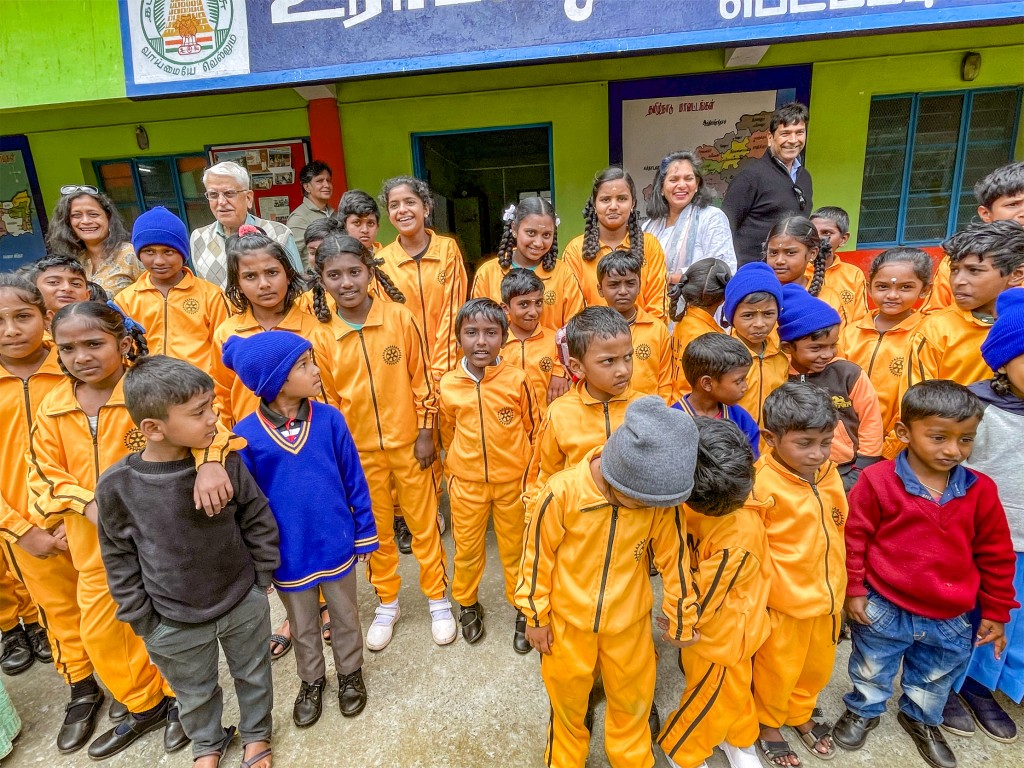
I visit the school, tucked away nicely in Bettati village near Coonoor, where the rich and famous have bought up land and built beautiful cottages. I am taken there by a bunch of RC Nilgiris club members, and seeing the banter and the camaraderie among them it is easy to understand how and why what began as a small project to give some books to the school, ended up creating sheer magic for the 68 children of this school. Chartered in 1941, this club has 45 members, 13 being women.
Air commodore Sanjay Khanna, the moving spirit and architect of this half a crore rupees project, explains its genesis. In Nov 2022, the club kicked off a project titled Vanga padikalam (Come, let’s read), where they collected books for schools. “Many of the books came from Dr Parvathi, a club member, who lives both here and in the UK, and when here, is a regular attendee of our meetings. She sent us a lot of beautiful books from the UK,” says Khanna.
As the Rotarians distributed these books to various schools “we realised that the infrastructure in government schools was very bad and the hygiene appalling. We found the toilets stinking, the kitchen was really bad and the children were sitting in damp and dreary classrooms. The entire environment was not conducive to education.”
This really depressed and dejected the core team of the club engaged in the reading project. They found little use in providing the tools for education in schools without giving a conducive learning environment. From there was born the idea to do up schools really well.
We had two options, either do little interventions in several schools or identify one school and make it a model school, in such a manner that it stands out as a role model for other schools to catch up with. And motivates other NGOs to take up other schools,” says Deepika Unni, the club’s public image chair.
In Nilgiris district, there are over 600 schools, in a radius of 3–4km you’ll get 10 schools.
– Headmistress Radha Krishnaraj
The Bettati school was chosen for two reasons; it had the real estate — a large campus with nearly two acres of land, providing ample scope for renovation and restructuring. Even though the school was only up to Class 8 and with 41 children, its rejuvenation would motivate more parents to send their children here. The place had eight classrooms and they knew that once these were rebuilt, painted and furnished with benches and desks, it could easily accommodate some 200 children. The biggest luxury here was the luxury of space.

“We began with the kitchen because the midday meal was being prepared there. The walls of the existing kitchen had fungus, the ration was kept on the floor and there were rodents running all over the place. We knew we would have to completely redo the toilets, separate ones for girls and boys. And we also constructed a toilet for the teachers,” says Khanna, who for personal reasons has recently stepped out of Rotary for the time being.
The classrooms were in a total mess; the floor was chipped, the walls had broken down and some of the rooms were separated by broken or tattered cardboard sheets, and the roof was leaking. The furniture was old and tattered, so the children had to sit on the floor. “This is the Nilgiris, it is cold and the kids can’t sit and study on the floor. There was one bulb only … so you can imagine that a lot needed to be done,” says club president Gr Captain C H N Kumar.
The initial money was raised through crowdfunding, and the target set was ₹15 lakh. “We began small, wanting to do two or three things but as you go along you get excited as you’re dealing with children. You see the joy on their faces, and the hope in their parents’ eyes and you feel let’s do more. We went to them in October, the actual work started in Jan 23, and by April we were done and handed over the school to them,” says Khanna.
Now our kitchen is top class — we have a member working in Taj Hotels, and the other day a team from there visited; they said our kitchen is on par with theirs.
– President C H N Kumar
Of the total of ₹51 lakh spent, while the initial amount came from crowdfunding, from club members, their friends and family, later the corporates joined, with almost half the money — ₹24 lakh — coming through CSR, and here, as usual past president Vijaya Dar put in a lot of effort.
Kotak Mahindra was the lead CSR company and contributed ₹17.6 lakh, totally funding an entire block. Star Chemicals gave ₹1 lakh for the kitchen, and Orissa Ferrotech pledged ₹10,000 every month for a year for the salary of the English teacher. While the club members contributed ₹4 lakh, eminent citizens of Coonoor funded the creation of a neat, clean and comfortable covered dining area. Earlier the children ate their midday meal seated on the floor, which would be freezing cold in winter.
Here I get an interesting nugget; a collective demand from the parents of the children for an English teacher. “This shows their aspiration that their children learn English in order to get good jobs. But they also asked for a Hindi teacher, which shows they’re seeking opportunities for their children all over India,” says Dar.
With the Rotarians engaging an English teacher and undertaking the responsibility of paying her salary for two years, the children now have the advantage of bilingual education — classes are conducted both in Tamil and English, with focus on spoken English. The great job the English teacher has done can be seen from most of the Class 8 children I pick for a conversation opting to speak in English! (See box)
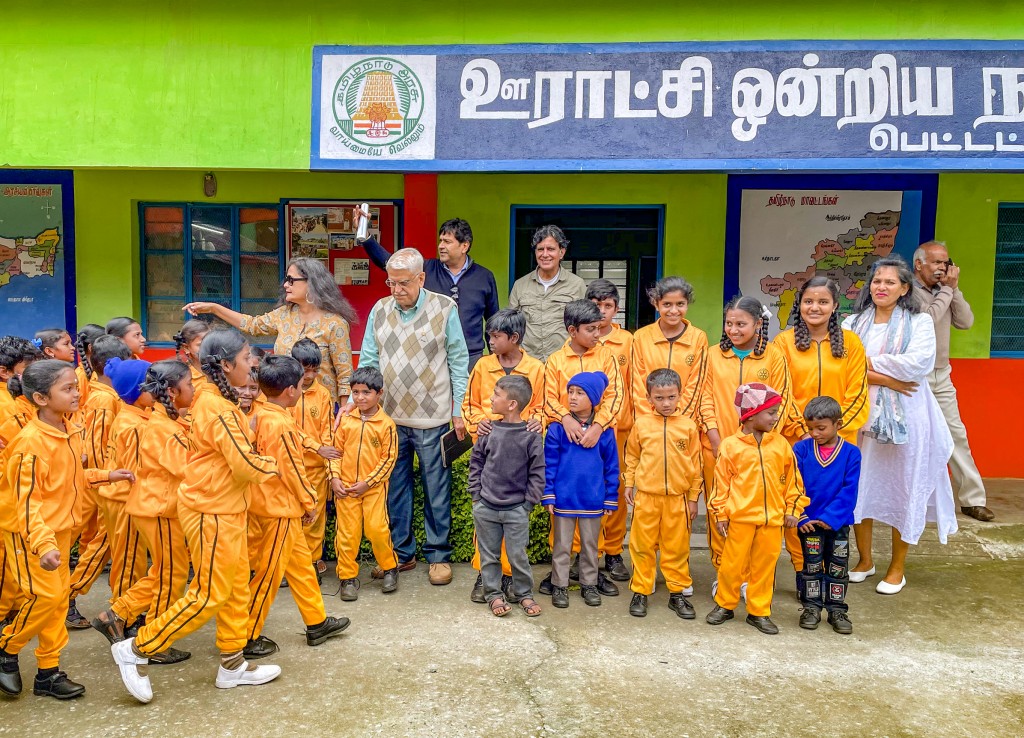
The school has now got a spanking new kitchen, and a secure storage area where the food material for the midday meal is kept in stainless steel containers. About the quality of the food club president Kumar says that while many other schools had an issue, “here the problem was only on the hygiene as the kitchen was in a real bad condition. But now our kitchen is top class — we have a past club president working in Taj Hotels, and the other day he had come with a team to plant fruit-bearing trees in the school garden. They said, ‘this kitchen is on par with ours!’”
Club secretary Sunil Goel explains that the younger children’s classrooms didn’t require too much civil work and just had to be painted and furnished, “but for the older children’s classrooms we did the roofing, the walls, the windows, lighting and got completely new furniture.”
To improve their spoken English, we, we will screen English movies, pausing it every 30 minutes to ask them what they have understood.
– Deepika Unni
On the bright colours — bright green and red are predominant — the Rotarians explain that the majority community in this area is the Badagas and they like bright colours, “particularly as the weather is gloomy here. The headmistress and the teachers chose the colours,” says Sheela Bhasin, club administrator.
A club member, who is a civil engineer took up the nitty-gritty of renovating all the eight classrooms, the kitchen, the toilets and the covered dining area. Deepika explains how one of their principal objectives was to provide a clean and hygienic separate toilet with running water for the girls, to prevent the girls from dropping out of school at puberty, as is the norm in many Indian villages.
Interestingly, the land on which the school was built in 1967 was donated by a Rotarian. Headmistress Radha Krishnaraj says earlier the school, which has classes till only eighth standard, had only 41 students but after its fantastic makeover, an English teacher being appointed, a new computer lab equipped with both desktops and laptops available for the children, the number has gone up to 68. This is one of the most popular rooms in the school where the science-cum- computer teacher Vijayalakshmi is really engaging the children on how to work on the computers. I find around a dozen girls and boys absorbed in their laptops and desktops — the school already had a few which were not working and the Rotarians repaired them, while also adding a few new machines.
We found the toilets stinking, the kitchen was really bad and children sitting in damp and dreary classrooms. The environment was not conducive to education.
– Sanjay Khanna
This vibrant room has really motivated more people in the region to gradually send their children to this school. With the teachers also talking to the local people about the mega change in their school, the strength has gone up.
“The school also had a smartboard which was not working, and we got it repaired and now so many programmes are run on it to engage the children,” explains Khanna; other Rotarians joke that during the project he got admitted to the school! The library exudes a lot of cheer and the children are lost in the wide array of books. The Rotarians have got the children bright yellow uniforms prominently displaying the Rotary wheel as well as shoes.
As I click away pictures of the students reading books, or keying in English and Tamil text on their computer screens, the air commodore explains how earlier a single teacher would simultaneously take classes for children from three different classes, such as Class 4, 5, and 6.
“The first row would have Class 4 children, the second row Class 5 children and so on.” You shudder to think of kind of learning these children would have got earlier. Vijaya Dar, who is from Kashmir, explains how this is common in government schools in Kashmir, even today. “The children of Classes 4, 5 and 6 study from the same classroom,” he says.
There are many government schools but parents seek only private schools. Recently my driver’s daughter joined LKG in an elite school where the fee is ₹40,000.
– Past president Vijaya Dar
Actually, it is not the number of schools in Nilgiris that is the problem; the problem is the infrastructure and the condition of the schools and the quality of education they offer. Radha estimates that there are over 600 government schools in the Nilgiris district (“in a radius of 3–4km you’ll get 10 schools”), Dar comments: “But sadly, some of them don’t have students. Because parents want to send their children to private English medium school, and every half a km, you will find one such school. That’s why we’ve employed an English teacher here.”
He shares that only recently “my driver’s daughter joined LKG in an elite school where the fee is almost ₹40,000 a year, and he came to me for help. I told him to send her here but couldn’t convince him. The name of the school makes all the difference.”
Unlike most government schools this panchayat school has an active PTA, which has become even more enthusiastic after the major uplift the school has received both in physical infrastructure and quality of education on offer. The government had appointed five teachers “but clearly more were needed if the students had to get reasonably good education. Can you imagine… the teachers came together and contributed from their salary a sum to employ more teachers! Now the parents have voluntarily decided to contribute ₹100 a month per child so more teachers can be appointed.”
He adds that ₹68,000 a month is a huge amount, and the PTA will decide how to deploy the amount. I learn that the government’s annual contribution for the upkeep and maintenance of this school is a paltry ₹22,000. “That is for the upkeep of the building, changing bulbs, fixing leaking taps and the rest. But by virtue of the school’s strength going up, we are hoping when the number crosses 80, one more teacher will be appointed,” adds Khanna. While the club pays the English teacher’s salary, the computer teacher’s salary is sponsored by the US-based brother of a club member.
With the scenario totally changing at this panchayat school, and seeing the enthusiasm and interest from the teachers, children and parents, the Rotarians have devised a strategy for the children’s higher education after Class 8. “Before moving out, we wanted to secure the future of at least some of the brighter children. While the headmistress is trying to add a higher class, after Class 8, every year as the school now has the required infrastructure, we are also making some connections,” smiles Khanna.
We began small, wanting to do two or three things but as you go along you get excited as you’re dealing with children.
–Sanjay Khanna
The plan is that every privileged or private school in the area should adopt a government school and the club’s Interact school, the Stanes Higher Secondary school, whose principal Glen Croning is a club member, “starting from this year, will take two students in Class 9. And we are looking forward to other elite schools doing the same.”
But meanwhile this school will continue its upward journey. “There is a lot of interest in extracurricular activities, and the students wanted a place to showcase their talent. So we’ve built a stage for them. We also want to encourage their hobbies and to improve their spoken English, we will screen English movies, pausing it every 30 minutes to ask them what they have understood. Every Friday some special activity will be held; on Kargil Vijay Diwas, our president Gr Capt Kumar explained to the children what had happened in Kargil. We want to organise something like this every Friday,” says Deepika.
Pictures by Rasheeda Bhagat
English, please!
When I converse with some of the older children at the panchayat school in Bettati, adopted by the Rotarians, their desire to learn and speak in the English language is evident. In the computer room, Yalini, a Class 8 student, says confidently that she wants to talk in English, and answers my questions effortlessly, even as her teacher beams! “My mother is a homemaker and my father is a driver. When I grow up, I want to become an army doctor,” she says cheerfully. She adds that after Class 8, she will move to another school for higher education.
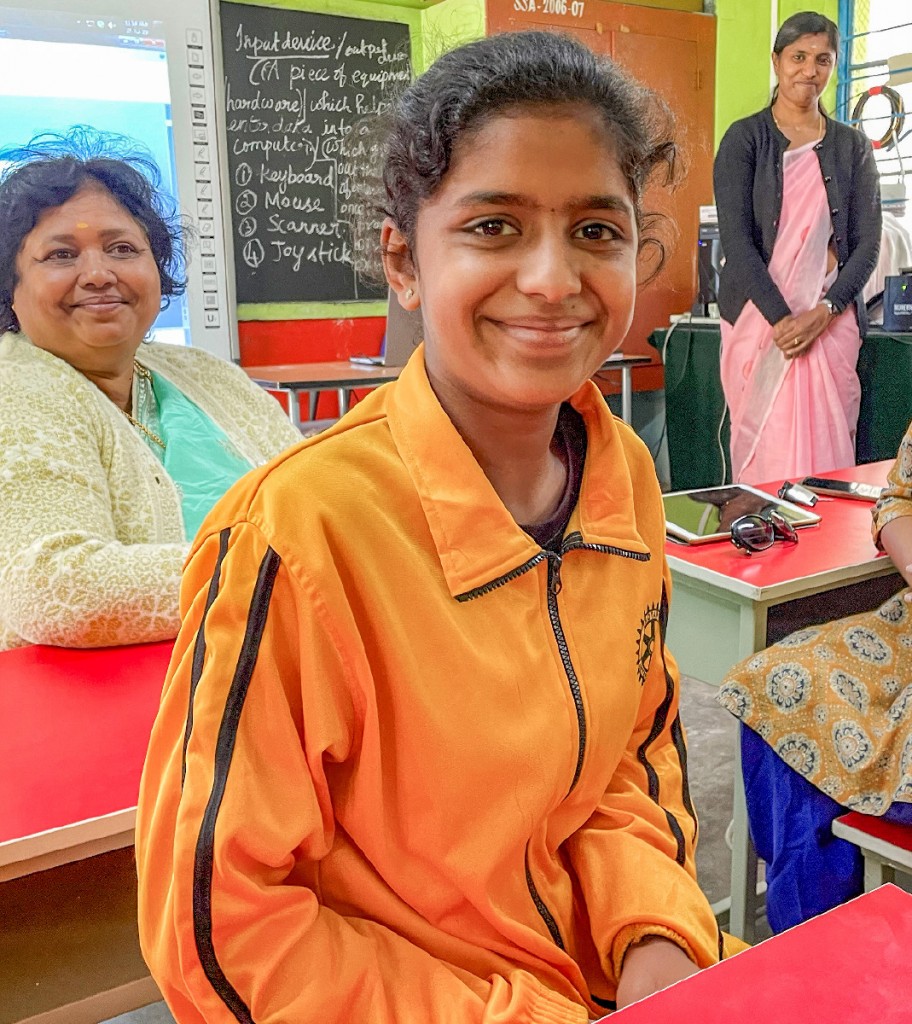
Later, Lt General M G Girish, a past president of the club and the moving spirit behind the stunningly beautiful crematorium this club has put up in Coonoor, tells me that he will organise a woman doctor from the Army (Wellington Cantonment) to speak to Yalini and mentor her.
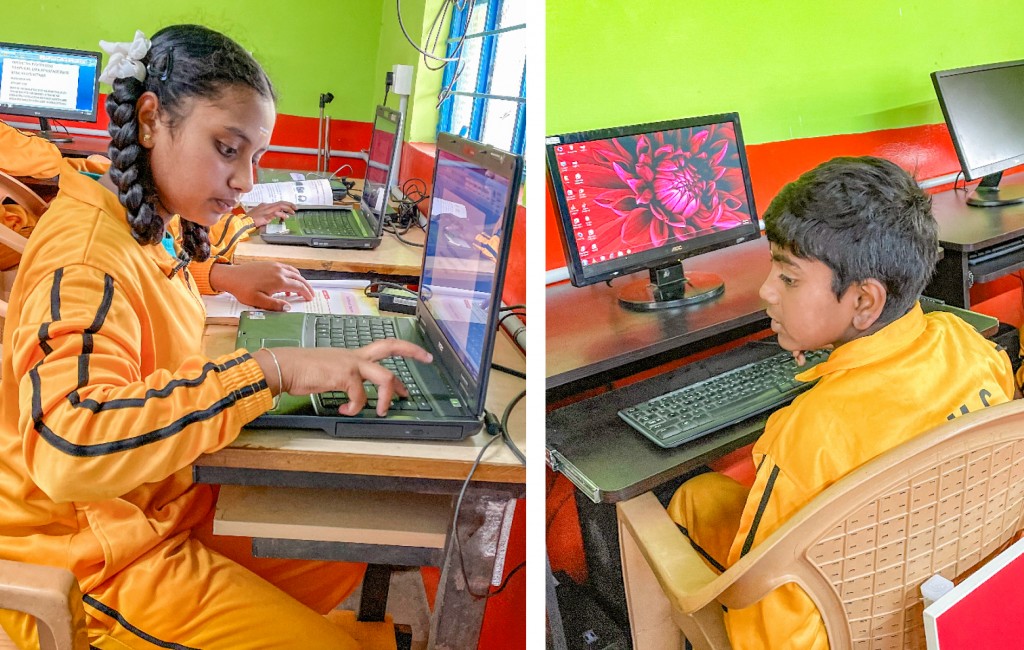
Likisha, also opts to talk in English, and says that while her mother is a “homemaker, my father is a farmer. The farm belongs to us and he grows vegetables like cabbage, potatoes, beetroot.” She won the second place in SpellBee and says she is learning to type on the computer. “We type stories and some passages from books.”
Her dream? “To become an IAS officer!”
Akash, also in Class 8, is not too sure of his English… yet, and opts to speak in Tamil. The smart young boy says both his parents work on the farm, and “I want to study further and become a civil engineer.”

